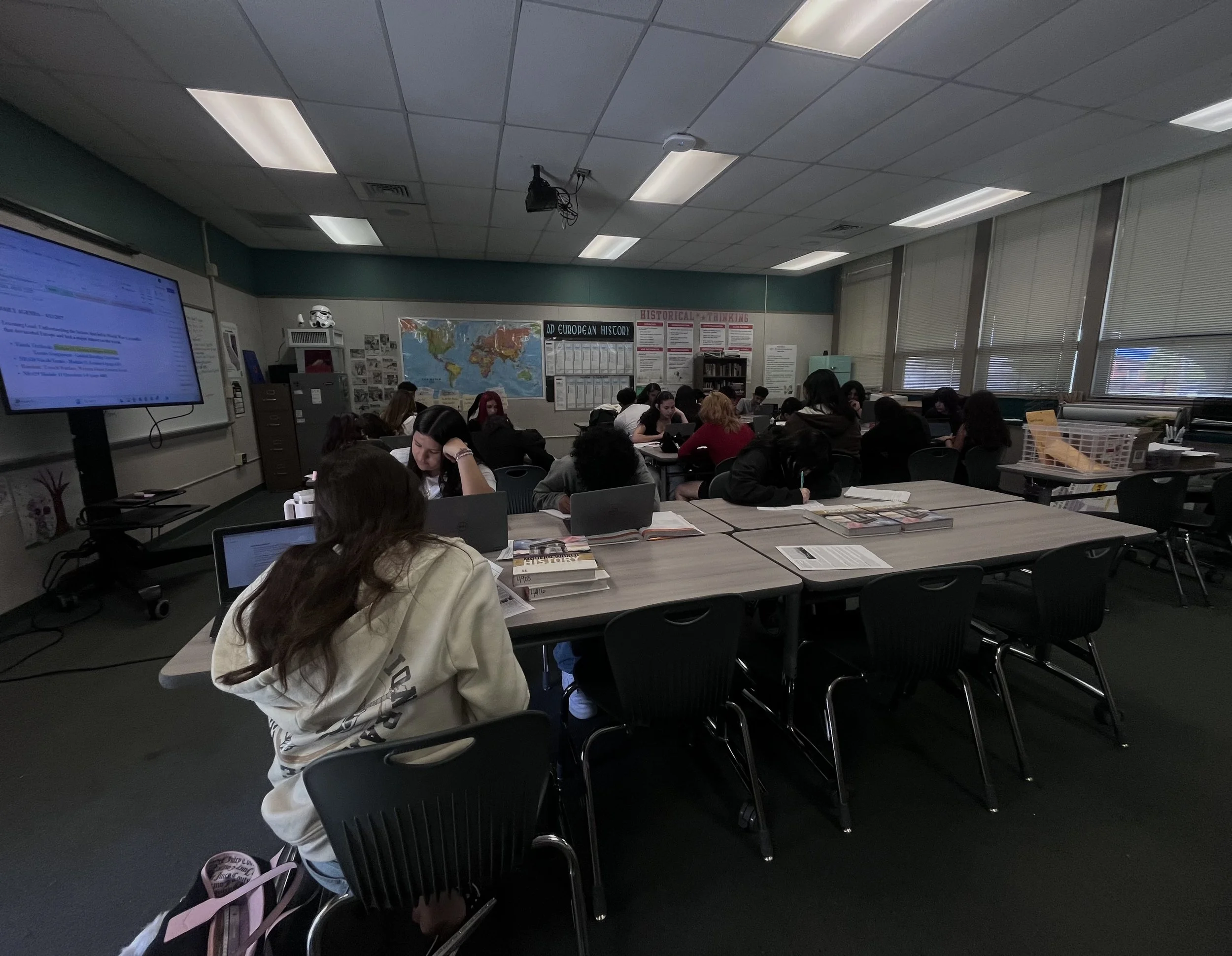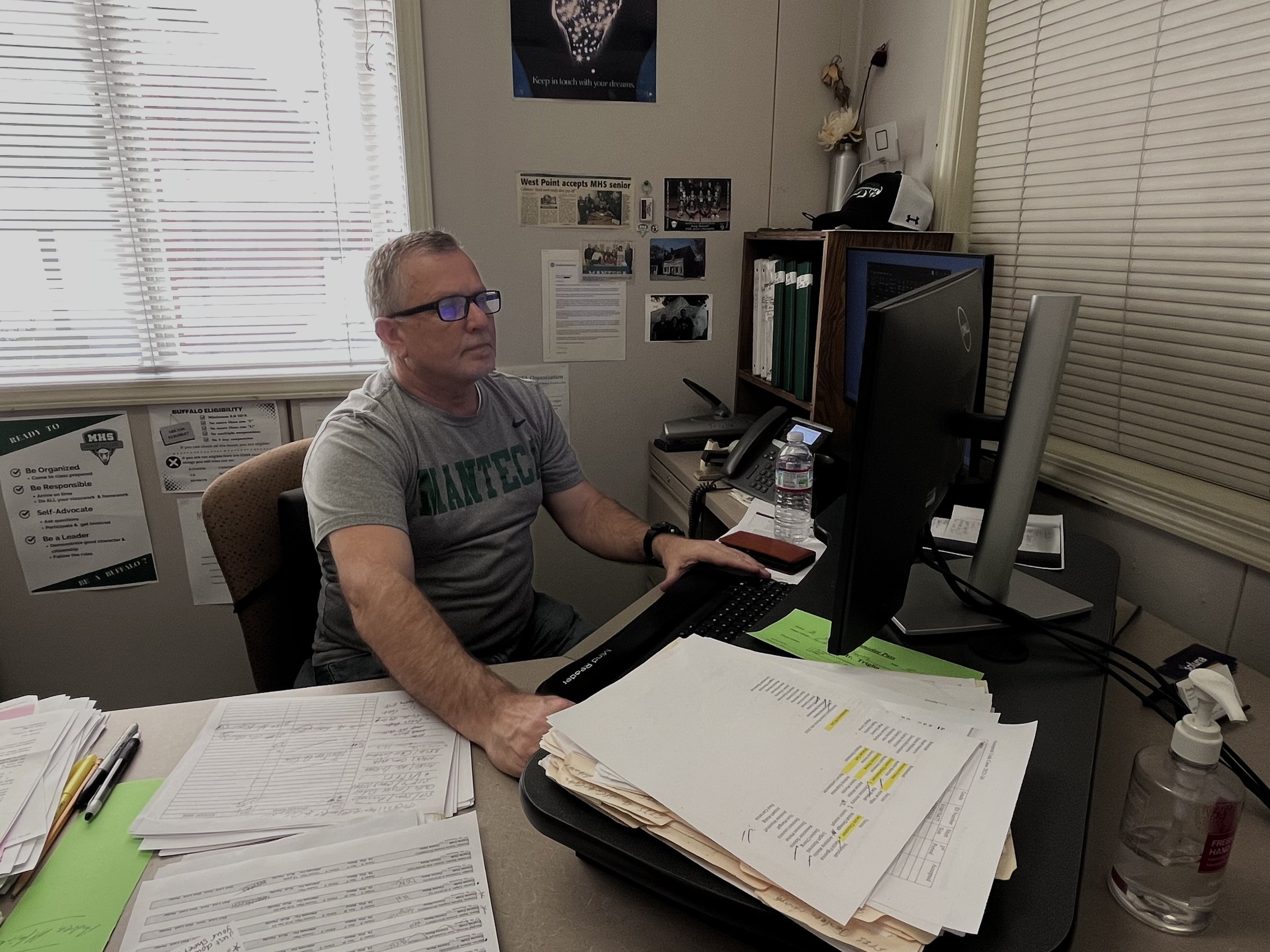Pressure to achieve: How academic expectations shape student life
Students in Linda Sumrall’s AP European History class at Manteca High School work in small groups.
By ALAYAH DUENES
The Tower
For high school students, academic learning is more than just grades and assignments. It is a constant balancing act of expectations, pressure, and personal growth. As students strive for success, the pressure to perform can affect not only their academic performance but also their mental health and motivation.
At Manteca High, both students and educators recognize the weight of academic pressure. From delayed gratification to juggling time between school, work, sports and personal life, students are often pushed to their limits.
Educators are working to support students by offering resources like counseling, tutoring, and mental health services, but the challenge remains in helping students understand the long-term value of their efforts. The conversation around academic pressure is ongoing, and so is the search for balance.
Academic success is often seen as the key to future opportunity, but for many students at Manteca High School, the pressure to achieve can feel overwhelming.
Manteca High counselor Frank Triglia sees firsthand the pressure academics have on students.
A formal survey conducted by The Tower revealed that 87 percent of students feel pressured to be successful academically, while only 13 percent said they do not. This data suggests that academic stress is commonplace on campus.
When asked about the main cause of that pressure, 36 percent of students pointed to the subject of the class, while 12 percent said pressure was created by the teacher’s instruction.
About 11 percent reported that sports take away from their academic focus.
Interestingly, 41 percent chose “none of the above,” suggesting that other factors, such as family expectations or personal ambition may be influencing their stress levels.
Academic pressure does not just stay within the classroom. According to the same survey, 85 percent of students believe that this pressure affects other parts of their lives, including athletics, relationships, and home life. Only 15 percent felt that it had no impact beyond school.
Manteca High guidance counselor Frank Triglia acknowledged that pressure is a reality for many students but believes it is something that can be managed with the right tools.
“Realistically, pressure is a part of the achievement process in many cases in life in general,” Triglia wrote in an email to The Tower. “The solution is more about having strategies and resources to manage the pressure successfully.”
When asked about the support systems they use to oversee academic stress, 40 percent of students said they rely on online resources and apps that help with time management and study techniques. Only 6 percent reported regularly meeting with their academic counselor for guidance, while 53 percent selected “other,” indicating a wide variety of personal coping methods or a lack of formal support.
Triglia noted that many students struggle with understanding the long-term value of their academic work.
“For many high school students, especially lower grade level high school students, one main struggle can sometimes be not having the understanding that grades, credits, and graduation are all mostly delayed gratification experiences, not immediate gratification experiences,” he said.
“Consequently, many students struggle with having the patience and self-discipline it takes to stay focused and follow through.”
Another issue, he added, is that students do not always take advantage of the support systems available to them.
“One of the biggest challenges I face is getting many students to realize that everything they are being asked to do in high school is an opportunity to better themselves,” he said.
“The other challenge related to that is trying to get students to take advantage of all their opportunities provided, such as tutoring, etc. Many students want to put in the minimal time and effort,” Triglia also mentioned.
Principal Megan Peterson reflected on how expectations from parents—and sometimes even internalized messages — can impact students' stress levels.
“I am an educator, so my expectation for my daughter was, ‘You need to be smart, and you have to be a student.’ I put too much pressure on her,” Peterson said. “Now she is in college, and she puts a ton of pressure on herself. It is that dynamic when your parents or guardians have always expected something of you, that becomes your internal dialogue.”
Peterson emphasized that while family expectations can be heavy, school should be a place of support, not stress.
“I am hoping it is not coming from teachers. Teachers should be supporting, not pressuring,” she said. “But I do think it’s a function of the amount of pressure both students and parents place on kids to excel.”
When asked how Manteca High supports students who feel overwhelmed, Peterson pointed to available mental health and counseling resources.
“We have guidance counselors and VCC for students to talk to,” she said. “I just had a conversation with a student the other day who was overwhelmed and pulling his hair out because he is overworked. Hopefully, teachers can help with that too.”
Peterson also highlighted the unique challenges Gen Z students face.
“One of my big concerns about this generation is mental health,” she said. “You are dealing with so much more—social media, the internet, political division, and the constant flow of information. We did not have that growing up.”
She explained that the school is doing its best to meet those needs.
“We are the adults in the room. It is our job to make sure students have access to the mental health support they need,” Peterson said. “That is why we have multiple social worker counselors on campus and referral services. We do not have enough, but we are always trying to provide more.”
External expectations also play a key role in academic stress. The survey found that 47 percent of students feel motivated to do well because of elevated expectations from their parents.
Meanwhile, 37 percent said they often compare themselves to peers based on teacher expectations, which creates stress. Additionally, 16 percent said pressure from teachers directly causes anxiety and affects their ability to concentrate.
As these results show, academic pressure at Manteca High is both widespread and deeply personal. But with open conversations, stronger support systems, and a focus on mental health, students can learn to manage the pressure and still succeed.


